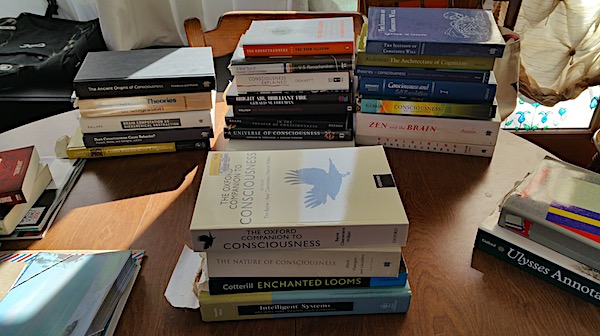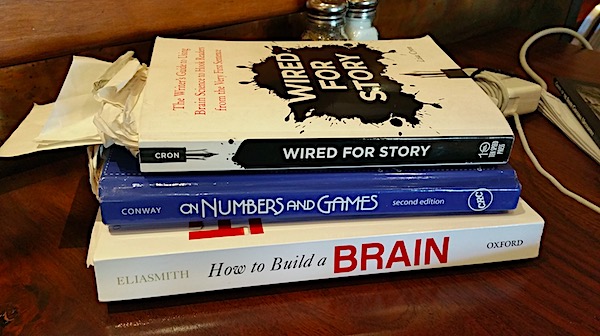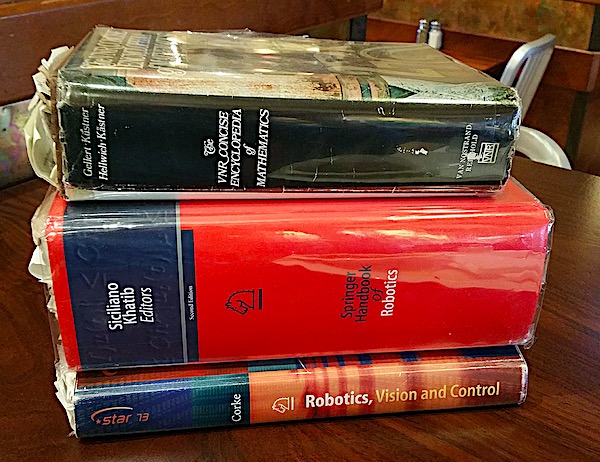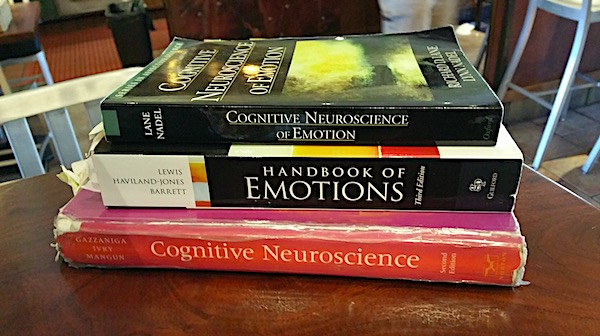
I used to believe that the secret is that there are no secrets. There’s no special diet that will evaporate away the pounds overnight, no special pencil that will instantly make you a great artist, no special practice that will solve all your problems at software development. There is, in short, no mystical food or enchanted pen or silver bullet that will take the place of the diligent application of hard work when you’re trying to solve a problem.
I used to believe that about books too - that there was no magic book filled with secrets.
I didn’t come to believe that overnight. I read a lot, and collect books even more; as a child I’d come home from the library tottering with piles of books, and when I got older and got tired of paying for late fees, I began amassing a library. I scour my home cities for volumes, and when I travel I harvest new places for their used bookstores, where obscure volumes are kept.

In particular, I’ve collected books in my subject areas - artificial intelligence, cognitive science, robotics, physics, writing, alternative culture, science fiction, and urban fantasy. Now, decades later, my library’s grown to ten thousand volumes, over fifty bookshelves spread out over three different locations, filled with almost every conceivable tome on the areas of my interest.

But there was a point, maybe not even five years ago, when I despaired of finding books that had the information I truly wanted. I’d searched and searched and could not find books that answered the questions I needed - usually technical details about problems in artificial intelligence. Eventually, I decided, there were no books of secrets which would help you quickly solve the problems that really mattered to you - that there were no magic books.
Fortunately, I was wrong.
There are books that are special. There are books which will quickly help you solve your problems, or which will rapidly help you gain insight into the world, or which will deeply enrich the quality of your life. There are, indeed, books that are magic.
I call them grimoires.
Now, the truth is, there still are no secrets. The word grimoire means “a book of magic spells,” but just like the spellbooks of legend, you can’t simply crack open one of the magic books I have in mind and get an instant result. You can’t even crack one of these books open and get an instant bad result: unlike the comically unfortunate Sorcerer’s Apprentice, if you flip open the master’s grimoire and attempt to apply the recipes unfiltered, you won’t get a runaway army of water-carrying broom-Terminators, but instead just some broken sticks and damp straw.
No, grimoires are books that you have to engage. Earlier I said there’s no magic diet, pencil, or practice that will solve all your problems. However, there are diets superior for losing weight, pencils that are great to draw with, and best practices which will prevent software problems. Unfortunately you can’t take advantage of them without willpower, effort and training.

So too with grimoires. Intuitively I’d known they existed for a while, because even as I was giving up on grimoires, I still populated my shelves with them - Misner, Thorne and Wheeler’s Gravitation , Russel & Norvig’s Artificial Intelligence: A Modern Approach , Joyce’s Ulysses , and so on - and had even read some cover to cover, like The Feynman Lectures on Physics , Wolfram’s A New Kind of Science , and Ayn Rand’s Atlas Shrugged . I’d even started to recognize my mistake as I was reading the “GBC Book”: Goodfellow, Bengio’s, and Courville’s masterful Deep Learning tome.
But it was a book called The Springer Handbook of Robotics that brought the point home.

I’m a roboticist, and I’d been struggling hard with a recalcitrant robot - not physically, of course, nor mentally, but programmatically: I was trying to get it to drive straight, and it was ramming itself straight into a wall. Once I spent more than a day and a half tearing apart its drive controller until I figured out the mathematics of what it was supposed to be doing well enough for me to figure out what it was actually doing wrong so I could ultimately figure out how to fix it.
Then I cracked open a chapter of The Springer Handbook of Robotics, Second Edition . This big red book came across my radar at my previous robotics project, where half a dozen people had the first edition on their shelves - and my officemate, Torsten Kröger, turned out to be the multimedia editor of the new edition. I had more than enough books to read, so I resolved to wait for the new edition to come out, to buy it to support my buddy Torsten, and to get him to sign it.
Eventually, the Handbook of Robotics landed on my doorstep, all 2,200 pages of it - the book is thicker than most books are wide and some books are tall. After getting Torsten to sign it - just carrying the book around caused the spine to crack a little - I decided to spend a little time reading a few chapters related to the work I had been doing before putting the book away.
I cracked open the chapter on navigation … and found the math for my robot problem.
This wasn’t something I had to dig at: it was right in front of me. The book had a chapter on my problem, and almost right at the start it reviewed all the math needed for a basic approach to the problem. Had I read it before I worked on the robot controller, I would have immediately understood that the code I was reading was implementing those very fundamental equations, and would have solved my problem in a half an hour rather than a day and a half. I realized that this book - which I discovered by going into robotics - is something I needed to have read before going into robotics.
Now, realistically, no-one can read a 2,200 page book prior to solving their problem … but, as Torsten explained to me, there’s something else going on here. Most of this enormous book isn’t relevant to my interests … but what is in the parts that are relevant to my interests are just the foundational results that are needed to understand that area of interest, and those results are annotated with references to the papers in which those results are derived and applied.
A true grimoire isn’t simply a comprehensive collection of all possible information on a topic - we call that a manual, and while grimoires are often comprehensive, and there are manuals that count as grimoires, manuals in general lack a true grimoire’s other attributes: focus, insight, and orientation. A true grimoire doesn’t just comprehensively exhaust its subject; it’s focused on some aspect of the subject, brings insight to bear that you can then use to orient you to the broader field.

Inspired by my experience with Goodfellow, Bengio and Courville’s Deep Learning book, with The Springer Handbook of Robotics, and to a lesser extent my experiences with fictional grimoires like James Joyce’s Ulysses, I’ve decided to start reviewing them here.
Next up: my criteria for reviewing a Canonical Grimoire … and how they differ from Grimoires by Reputation, Classic Reference Books, Thin Little Volumes, and their fictional counterparts, Tours de Force.
-the Centaur